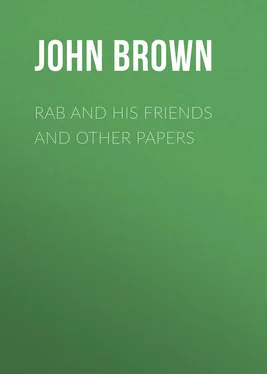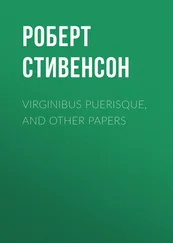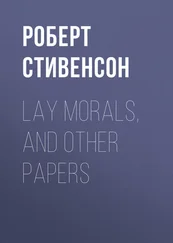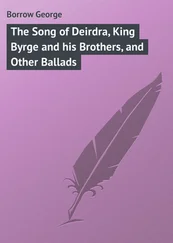John Brown - Rab and His Friends and Other Papers
Здесь есть возможность читать онлайн «John Brown - Rab and His Friends and Other Papers» — ознакомительный отрывок электронной книги совершенно бесплатно, а после прочтения отрывка купить полную версию. В некоторых случаях можно слушать аудио, скачать через торрент в формате fb2 и присутствует краткое содержание. Жанр: foreign_antique, foreign_prose, на английском языке. Описание произведения, (предисловие) а так же отзывы посетителей доступны на портале библиотеки ЛибКат.
- Название:Rab and His Friends and Other Papers
- Автор:
- Жанр:
- Год:неизвестен
- ISBN:нет данных
- Рейтинг книги:5 / 5. Голосов: 1
-
Избранное:Добавить в избранное
- Отзывы:
-
Ваша оценка:
- 100
- 1
- 2
- 3
- 4
- 5
Rab and His Friends and Other Papers: краткое содержание, описание и аннотация
Предлагаем к чтению аннотацию, описание, краткое содержание или предисловие (зависит от того, что написал сам автор книги «Rab and His Friends and Other Papers»). Если вы не нашли необходимую информацию о книге — напишите в комментариях, мы постараемся отыскать её.
Rab and His Friends and Other Papers — читать онлайн ознакомительный отрывок
Ниже представлен текст книги, разбитый по страницам. Система сохранения места последней прочитанной страницы, позволяет с удобством читать онлайн бесплатно книгу «Rab and His Friends and Other Papers», без необходимости каждый раз заново искать на чём Вы остановились. Поставьте закладку, и сможете в любой момент перейти на страницу, на которой закончили чтение.
Интервал:
Закладка:
And what of Rab? I asked for him next week at the new carrier who got the goodwill of James's business, and was now master of Jess and her cart. "How's Rab?" He put me off, and said rather rudely, "What's your business wi' the dowg?" I was not to be so put off. "Where's Rab?" He, getting confused and red, and intermeddling with his hair, said, "'Deed, sir, Rab's deid."
"Dead! what did he die of?"
"Weel, sir," said he, getting redder, "he didna exactly dee; he was killed. I had to brain him wi' a rack-pin; there was nae doin' wi' him. He lay in the treviss wi' the mear, and wadna come oot. I tempit him wi' kail and meat, but he wad tak naething, and keepit me frae feedin' the beast, and he was aye gur gurrin', and grup gruppin' me by the legs. I was laith to mak' awa wi' the auld dowg, his like wasna atween this and Thornhill, – but,'deed, sir, I could do naething else." I believed him. Fit end for Rab, quick and complete. His teeth and his friends gone, why should he keep the peace, and be civil?
He was buried in the braeface, near the burn, the children of the village, his companions, who used to make very free with him and sit on his ample stomach, as he lay half asleep at the door in the sun, watching the solemnity.
HER LAST HALF-CROWN
Once I had friends – though now by all forsaken;
Once I had parents – they are now in heaven.
I had a home once – "
Worn out with anguish, sin, and cold, and hunger,
Down sunk the outcast, death had seized her senses.
There did the stranger find her in the morning —
God had released her.
Hugh Miller, the geologist, journalist, and man of genius, was sitting in his newspaper office late one dreary winter night. The clerks had all left, and he was preparing to go, when a quick rap came to the door. He said "Come in," and, looking towards the entrance, saw a little ragged child all wet with sleet. "Are ye Hugh Miller?"
"Yes."
"Mary Duff wants ye."
"What does she want?"
"She's deein'." Some misty recollection of the name made him at once set out, and with his well-known plaid and stick, he was soon striding after the child, who trotted through the now deserted High Street, into the Canongate. By the time he got to the Old Playhouse Close, Hugh had revived his memory of Mary Duff; a lively girl who had been bred up beside him in Cromarty. The last time he had seen her was at a brother mason's marriage, where Mary was "best maid," and he "best man," He seemed still to see her bright young careless face, her tidy short gown, and her dark eyes, and to hear her bantering, merry tongue.
Down the close went the ragged little woman, and up an outside stair, Hugh keeping near her with difficulty; in the passage she held out her hand and touched him; taking it in his great palm, he felt that she wanted a thumb. Finding her way like a cat through the darkness, she opened a door, and saying, "That's her!" vanished. By the light of a dying fire he saw lying in the corner of the large empty room something like a woman's clothes, and on drawing nearer became aware of a thin pale face and two dark eyes looking keenly but helplessly up at him. The eyes were plainly Mary Duff's, though he could recognise no other feature. She wept silently, gazing steadily at him. "Are you Mary Duff?"
"It's a' that's o' me, Hugh." She then tried to speak to him, something plainly of great urgency, but she couldn't; and seeing that she was very ill, and was making herself worse, he put half-a-crown into her feverish hand, and said he would call again in the morning. He could get no information about her from the neighbours: they were surly or asleep.
When he returned next morning, the little girl met him at the stair-head, and said, "She's deid." He went in, and found that it was true; there she lay, the fire out, her face placid, and the likeness to her maiden self restored. Hugh thought he would have known her now, even with those bright black eyes closed as they were, in aeternum.
Seeking out a neighbour, he said he would like to bury Mary Duff, and arranged for the funeral with an undertaker in the close. Little seemed to be known of the poor outcast, except that she was a "licht," or, as Solomon would have said, a "strange woman."
"Did she drink?"
"Whiles."
On the day of the funeral one or two residents in the close accompanied him to the Canongate Churchyard. He observed a decent-looking little old woman watching them, and following at a distance, though the day was wet and bitter. After the grave was filled, and he had taken off his hat, as the men finished their business by putting on and slapping the sod, he saw this old woman remaining; she came up and, courtesying, said, "Ye wad ken that lass, Sir?"
"Yes; I knew her when she was young." The woman then burst into tears, and told Hugh that she "keepit a bit shop at the close-mooth, and Mary dealt wi' me, and aye paid reglar, and I was feared she was dead, for she had been a month awin' me half-a-crown: " and then, with a look and voice of awe, she told him how on the night he was sent for, and immediately after he had left, she had been awakened by some one in her room; and by her bright fire – for she was a bein , well-to-do body – she had seen the wasted dying creature, who came forward and said, "Wasn't it half-a-crown?"
"Yes."
"There it is," and putting it under the bolster, vanished!
Poor Mary Duff! her life had been a sad one since the day when she had stood side by side with Hugh at the wedding of their friends. Her father died not long after, and her mother supplanted her in the affections of the man to whom she had given her heart. The shock made home intolerable. She fled from it blighted and embittered, and after a life of shame and misery, crept, into the corner of her room to die alone.
"My thoughts are not your thoughts, neither are your ways my ways, saith the Lord. For as the heavens are higher than the earth, so are my ways higher than your ways, and my thoughts than your thoughts."
OUR DOGS
" The misery of keeping a dog is his dying so soon; but to be sure, if he lived for fifty years, and then died, what would become of me? " – Sir Walter Scott.
" There is in every animal's eye a dim image and gleam of humanity, a flash of strange light through which their life looks out and up to our great mystery of command over them, and claims the fellowship of the creature if not of the soul ." – Ruskin.
" They say that Socrates swore by his dog. " – Montaigne.
To Sir Walter and Lady Trevelyan's glum and faithful PETER, with much regard .
I was bitten severely by a little dog when with my mother at Moffat Wells, being then three years of age, and I have remained "bitten" ever since in the matter of dogs. I remember that little dog, and can at this moment not only recal my pain and terror – I have no doubt I was to blame – but also her face; and were I allowed to search among the shades in the cynic Elysian fields, I could pick her out still. All my life I have been familiar with these faithful creatures, making friends of them, and speaking to them; and the only time I ever addressed the public, about a year after being bitten, was at the farm of Kirklaw Hill, near Biggar, when the text, given out from an empty cart in which the ploughmen had placed me, was "Jacob's dog," and my entire sermon was as follows: "Some say that Jacob had a black dog (the o very long), and some say that Jacob had a white dog, but I (imagine the presumption of four years!) say Jacob had a brown dog, and a brown dog it shall be."
I had many intimacies from this time onwards – Bawtie, of the inn; Keeper, the carrier's bull-terrier; Tiger, a huge tawny mastiff from Edinburgh, which I think must have been an uncle of Rab's; all the sheep dogs at Callands – Spring, Mavis, Yarrow, Swallow, Cheviot, etc.; but it was not till I was at college, and my brother at the High School, that we possessed a dog.
Читать дальшеИнтервал:
Закладка:
Похожие книги на «Rab and His Friends and Other Papers»
Представляем Вашему вниманию похожие книги на «Rab and His Friends and Other Papers» списком для выбора. Мы отобрали схожую по названию и смыслу литературу в надежде предоставить читателям больше вариантов отыскать новые, интересные, ещё непрочитанные произведения.
Обсуждение, отзывы о книге «Rab and His Friends and Other Papers» и просто собственные мнения читателей. Оставьте ваши комментарии, напишите, что Вы думаете о произведении, его смысле или главных героях. Укажите что конкретно понравилось, а что нет, и почему Вы так считаете.












